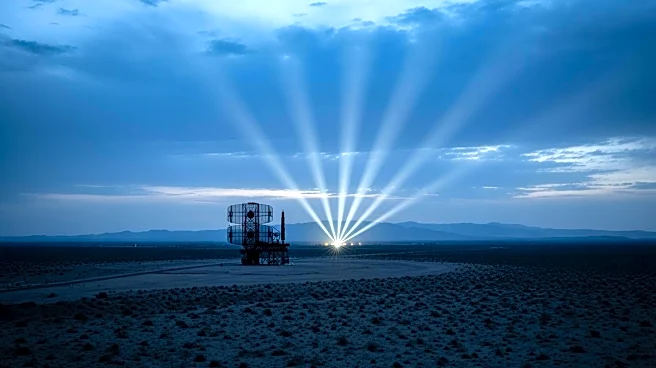What's Happening?
Veteran economist Steve Hanke has expressed concerns that the current boom in artificial intelligence (AI) could end in a market collapse similar to the dot-com bubble. Hanke, a professor of applied economics at Johns Hopkins University, highlighted the risk of AI companies failing to meet their growth forecasts, which could indicate an overheated market. He referenced the term 'irrational exuberance,' coined by former Federal Reserve Chair Alan Greenspan, to describe the market's mood during the dot-com era when US stocks surged significantly. Hanke noted that the dot-com bubble burst when market euphoria reached irrational levels, leading to a significant drop in the Nasdaq index and the S&P 500. He emphasized that the sustainability of the current AI market depends on whether companies like Nvidia, OpenAI, Oracle, and Palantir can achieve their ambitious revenue projections.
Why It's Important?
The potential bursting of the AI bubble could have significant implications for investors and the broader technology sector. If AI companies fail to meet their growth expectations, it could lead to a sharp decline in stock prices, affecting investor portfolios and market stability. The AI sector has seen substantial investment and growth, with companies like Nvidia and OpenAI projecting significant revenue increases. A collapse could impact not only these companies but also related industries and the overall economy. Investors and stakeholders in the tech industry may face financial losses and increased market volatility, underscoring the importance of cautious investment strategies and realistic growth assessments.
What's Next?
Investors and market analysts will likely monitor AI companies' performance closely to assess the validity of their growth forecasts. Any signs of underperformance could trigger market corrections and increased scrutiny of AI investments. Companies may need to adjust their strategies to ensure sustainable growth and avoid contributing to market instability. Stakeholders, including policymakers and industry leaders, might consider implementing measures to mitigate potential risks associated with an overheated AI market. The situation calls for vigilance and strategic planning to navigate potential challenges and capitalize on opportunities within the AI sector.
Beyond the Headlines
The potential bursting of the AI bubble raises questions about the ethical and cultural implications of rapid technological advancements. As AI continues to evolve, concerns about data privacy, job displacement, and the societal impact of automation may become more pronounced. The industry may face increased pressure to address these issues and ensure responsible development and deployment of AI technologies. Long-term shifts in workforce dynamics and economic structures could result from the integration of AI, necessitating adaptive policies and educational initiatives to prepare for future changes.









